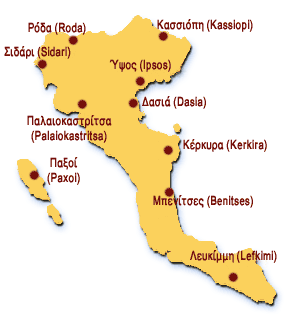

The name Corfu or Corifo comes from the ancient saying "city of the Mountain point" because of the two hills that stand in the land. Corfu used to have many names in the past like scythe, because it looked like a scythe, or Makria (it means long in Greek), because the island is long, or Kassiopia, Keraina, Arpi und Sheria, like Homer used to call it. The mythology mentions that the island got its name from the nymph Kerkyra, whom Poseidon brought to the island. The fruit of their love was Faiakas, ancestor of the ancient Faiakes, people who according to Homer, offered hospitality to Ulysses before he arrived in Ithace. The known Homeric hero arrives, exhausted after many adventuries, in the island where Nausica - the daughter of the King of Faiakes Alkinoos - finds him and brings him to the rich palace of her father, where he is offered the best hospitality and honors that are suitable for all strangers. The mythical ancestors of the inhabitants of Corfu are present in Homer's Epic as the founders of a great technological civilization with the best equipped navy and a democratical organized society. However, it is not verified from the archaeology yet. On the contrary there are findings that reveal the existence of inhabitants since the Stone Age (in Agios Mathaios) and the neo- Stone Ago (in Sidari) and in the Copper Age (in Kefali, Amfioenes).

The first Greeks who arrived in the island came from Eretria, Evia (775-750 BC). Later it was inhabited by the Corithians (735 BC). They built the ancient city and the acropolis, that exists today in the Analipsis. Soon enough Corfu became a great commercial power with a powerful navy. It founded its own Collonies and it became independent from Corinth. This rich island, in the following years, was the apple of discord between the two powerful states of that time, Athens and Sparta. Later, the island was under the Macedonian protection and it prospered until it was seized by the Tyrant of Syracuse and later by the King of Epirus, Pyrros. Nevertheless, soon enough the island finally passes to the Romans (229 BC). In this time Corfu looses its power and the privileges of its people. In the Byzantine times the adventures of Corfu continued, with many successive conquerors, while its defense was enforced by the entrenchment of the new city and the old fortress. Many barbarians seized the island and destroyed it. In the beginning of the 11th century the Normans conquered the island while soon it passes back to the Byzantines with Venetians on their side, in 1386. The island remains to Venetians until 1797, after they have successfully confronted the Turkish efforts to conclude Corfu in Ottoman Empire. They also prevented the uprising of the folk people, who were opposed to pay to the landed class.

In 1797 Corfu was conquered by France. The French were not the saviors that the island was hoping for. They supported the royal class by imposing more taxes. They were proved to be more barbarian than the previous conquerors. They looted the churches and the fortresses carrying all the loot to their country. Two years later the Russian- Turkish fleet conquered the island and in 1800 the Ionian Islands were recognized as an autonomous Greek state, that has to pay taxes to Turkey. That was the core from where the revival of the Greek nation started. In 1806 the French returned, this time they were creating and not destructing. This time they build new fortresses for the city, they plant many trees and they build big, imposing buildings. They emphasized on agriculture and education by founding the Ionian Academy, in 1808, with its valuable contribution to the Greek arts. In the vortex of the English- French conflict, and after the fall of Napoleon, Corfu, along with the rest of the Ionian islands, passes to the English domination, in 1814, who did not protect the inhabitants of Corfu but were cruel to those who were against the status-quo. They were merciless to the Freedom Party of Greeks in 1821, as well as to the unification of the Ionian islands with the newly-established Greek state. The British occupation also had positive effects, like the development of the economy, while they promoted the education and the Greek language as the official language of the island. In 1824 the New Ionian Academy was build, which was the first Greek University by which some of the most spiritual people were pushed forward, like: Andreas Kalvos, Petros Vrailas and some more.

Parallel revival is observed in the Arts with the foundation of the first Greek Art school, in 1815, by the famous Paul Prosalentis, as well as the foundation of musical societies and lyric theatres. In 1864 this island was given as a "gift" to the new King of Greece, George I, by the protecting Powers. After its union with Greece, Corfu looses its spiritual avant-garde but the economy prospers due to the creation of the big market. The agriculture is modernized and boosts the industry. During World War I, the ally troops seized Corfu and used it as a base until the end of the war. During World War II, Corfu was conquered first by the Italians and then by the Germans who burned and destroyed houses, historical and architectural monuments and valuable cultural treasures were transformed to ruins. In 1944, people with persistence and love for Corfu, managed to bring back its grandeur, making it one of the cosmopolitan resorts in the Mediterranean Sea.
